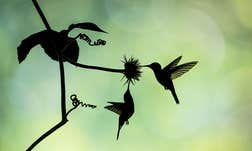Parasite” connotes freeloading, getting something for nothing. It brings to mind slimy, wriggly things living in the intestines or secretly making a home under the skin. The word, at least in the English language, is associated with everything bad and nothing good. But parasites are not all take and no give. On the one hand, they can deplete a host’s resources and help to wipe out entire populations—and even species—but they are also critical to biodiversity in many ecosystems.
That parasites can be beneficial is not a new idea, but lately scientists are trying to better understand the precise role they play in animal survival and ecosystem balance to help conservation efforts, safeguard endangered species, and even protect parasites themselves.
One team of Israeli researchers from Tel Aviv University recently published a paper in Frontiers in Microbiology that found parasites can allow closely related host species to coexist in a delicate habitat. The Israeli study focused on Daphnia water fleas, common pond and stream dwellers, and the parasites they host. These tiny crustaceans feed on single-celled algae and bacteria and can serve as dinner for fish. One species, nicknamed “Super Daphnia,” is super-resistant to parasites, but this doesn’t give it a competitive edge in the pond. Instead, the water flea that is most common is another that is a parasite magnet, Daphnia magna.
To better understand the way this plays out, the researchers built two pond microcosms in the lab. One contained the two Daphnia species with parasites, and the other contained the two Daphnia species without parasites. One contained the two flea species with parasites, and the other contained the two flea species without parasites. In the parasite-free habitat, the parasite magnet species, the most common in the wild, won the competition, forcing extinction of the Super Daphnia. But in habitats with parasites, the two could co-exist. The authors explain the finding may help guide efforts to fend off biological invasions and reduce threats to endangered species.
In another recent paper in Cell: Trends in Parasitology, Joshua Brian, a scientist from Kings College in London, argues that many parasites themselves are at risk of extinction. Parasites that have long life cycles and depend on more than one host during their life cycle are at highest risk of extinction, he writes, but they also contribute the most to ecosystem-level stability. Parasites can even serve as valuable biomarkers, given that a diverse parasite community is a reflection of a healthy and abundant host community.
Brian offers the example of freshwater mussels, which provide a number of ecosystem services in their global habitats such as water filtration. Mussels are afflicted by many parasites, but larval freshwater mussels are themselves parasites on fish and have a variety of negative impacts on their hosts. These negative effects for individual fish are necessary for the mussels to provide the ecosystem-level benefits.
“The key point of this complex set of interactions is that a binary of ‘positive’ or ‘negative’ effects is neither accurate nor meaningful,” Brian writes. “Subjective human values and medical or veterinary objectives typically inform our opinion of parasites, but regarding parasites as ‘friends’ or ‘foes’ is a false moral dichotomy.” When parasites take a ride on—or in—their hosts, they are also giving back. ![]()
Lead photo by Enav Marcus shows two Daphnia water fleas—on the left a healthy Daphnia and on the right a Daphnia infected by a parasite.




























